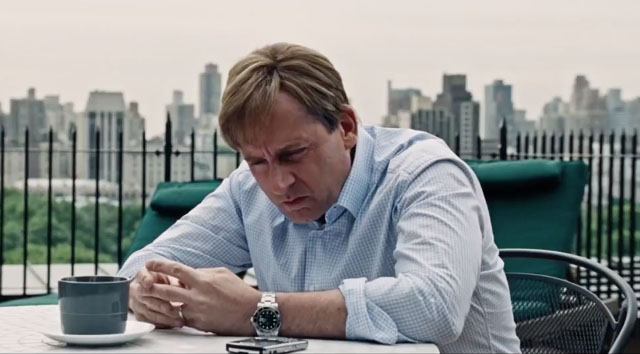McKay assembles the above cast wisely, as listening to a cocksure Gosling or an irascible Carell discuss anything is going to be entertaining. That's one of several tricks he uses to hold viewer interest in what is a dense, jargon-heavy script. Apt metaphors are incorporated, like a Jenga tower to describe mortgage. Apparently deciding that there's just no good way to organically work in definitions and concepts like default swaps and CDO's, McKay just has a character, usually Gosling's Vannett, address the camera directly about the problem and then cut to, say, Margot Robbie in a bubble bath cogently explaining subprime loans. The easy comparison is Wolf of Wall Street, but where Jordan Belfort used his camera-addresses to wave his hands and distract, The Big Short uses them to make sure the viewer is never losing the thread of how such a disaster was allowed to happen. Interstitials like these have the potential to break the film, but McKay and co-writer Charles Randolph have taken it upon themselves to educate and entertain in equal measure.
That goal is obviously front and center in McKay's mind because his film is angry. Like Spike Lee's equally incendiary Chi-Raq, The Big Short has the urgency of a sounding klaxon, except what it's concerned about already happened. In McKay's and Randolph's telling, the banks have accumulated astronomical levels of wealth that breed corruption and group think amongst those that should be able to hit the brakes. The appearance of success and the smell of money turn off critical thinking skills. Avatars of Goldman Sachs and the SEC are literally in bed with each other. The head of a ratings agency (played in a cameo by Melissa Leo) is actually blind. McKay and Randolph also recognize that their main characters, speaking truth to power though they may be, stand to profit where millions of others lost significantly, making them scavengers of human misery. Pitt's Rickert gets to be the conscience of the film, angrily reminding his ecstatic young proteges that ticks in the unemployment rate mean deaths and suicides and homelessness. Subtlety is as far away from The Big Short as foresight was from the boardrooms of the big banks.
The primary mouthpiece of McKay's rage is Carell's Baum, who steals the film going away. Running from start to finish at elevated blood pressure, Baum often spends screentime with his head in his hands, shocked at what he is hearing about the state of the economy, and the bravado of those taking it to the brink. He's given the most character development as well, resulting in additional shading on his acerbic, no-bullshit personality. He shares several scenes with Gosling in a Crazy, Stupid, Love reunion, with Gosling repeating his role of knowledgeable upstart to Carell's baffled elder. McKay gambles with Gosling, as the viewer is effectively rooting for an impossibly attractive and well-dressed rich young man to get richer, but by having Vannett acknowledge all this up front in one of his camera addresses, the bomb gets defused early. In the Pitt third of the film, Wittrock and Magaro are irrepressible in their enthusiasm, and there's the thrill of the little guy getting one over on the big guy, despite Pitt's admonitions. Bale never interacts with any of the other characters, effectively in his own short film. Despite the character's love of heavy metal, the volume and urgency is turned down much lower when Bale's onscreen. His quiet, steadfast resolve is a sharp contrast to the liveliness of the other threads, functioning as a breather before getting back into the meta Vannett or barn-busting Baum.
The disconnectedness of The Big Short allows it to cast a wide net and build a big ensemble, but the value of that decision is unclear. All three parties follow the same arc, from discovery to skepticism to derision to validation. Picking one thread and sticking with it might have allowed for more character development without skimping on the level of education that McKay is going for. It also bears mentioning that this is a male-heavy film. Female casting is restricted to a perfunctory Mrs. Baum role for Marisa Tomei, and in an unfortunate coincidence, three separate cases of officials being asleep at the switch. The SEC is represented by a mercenary sorority girl, the ratings agencies by the myopic Leo, and Baum's own in-house vigilance committee is led by a well-meaning but clueless Adepero Oduye. It's a small thing, but noticeable, when all the men are making money coming or going and the women only ineffectual. Lastly, McKay is in no way on the hook for being the end-all delineator of the financial crisis, but his ire is reserved solely for Wall Street and ignores any mention of government-sponsored entities like Fannie and Freddie Mac. If his goal is partly to educate, that's a significant chunk left unexamined.
As depressing and frustrating as the material in The Big Short is, McKay cannot help but make a funny movie. I doubt there was as much improvisation as he usually partakes in, but the script is still laden with asides and retorts and the actors bring an expected comic timing to the proceedings that makes funny lines funnier. This is a necessary leavener, because again, this is depressing. The Big Short may have been defeated for the Best Picture Oscar by Spotlight, but both films document widespread and systemic corruption that permeates all levels of society. 2015 was a good year for revisiting grand-scale crimes, though at least with Spotlight, people actually went to jail. B+

 RSS Feed
RSS Feed